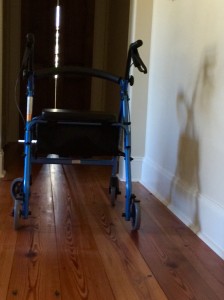I get Esau. I don’t get Jacob.
They’re brothers, bursting through the pages of the book of Genesis. It’s likely they hated each other for a good bit of their lives. Jacob, the smarter twin whose name means “supplanter” has tremendous presence of mind to take advantage of Esau’s weakness, not once but twice. First the birthright, then the blessing due to the firstborn son. Esau falls so neatly into Jacob’s trap. I imagine him as a rough and tumble man, boisterous, and dedicated to his own work but ultimately vulnerable in the hands of an opportunistic brother. Sadly, history and my Sunday School teachers remember Esau as something of a doofus. A mess-up. Sneaky Jacob gets to be a patriarch from whom King David, and eventually Christ descend.
A phrase from these stories has stood out to me over the years: “Sold for a mess of pottage.” Pottage, the archaic term for porridge, is what Esau is said to have accepted from his brother Jacob in exchange for his birthright. Since then, selling something for a “mess of pottage” means to behave shortsightedly, ready to trade something valuable for momentary comfort.
I can’t say I’ve ever sold my birthright for a mess of pottage. My family isn’t rich. Even though I’m my parents’ firstborn, there’s no blessing or birthright attached to the position. But my attachment to Esau remains. I guess I like underdogs. But I also think most of us go through bouts of bad decision-making and eat pottage when we should say “no thank you, I’ve had enough.”
The past seven months have ushered in some major life changes for me. I have written about starting over in a new city, marrying after a long sojourn as a singleton, attempts at a new career as a writer–which some would consider achingly white and middle class, and trying to redeem lost time pursuing things that would make other people happy.
In the past seven months I have sat in front of the computer screen, bursting with ideas for short stories and novels, ready to drill down and invest hours coaxing half-formed ideas into solid ones, to invest myself in the practice of writing daily so that it becomes the most important thing I do. Then I suddenly switch screens to the comforts of Netflix.
Why do I (we) self-sabotage like this? Why sell ourselves, if not for a mess of pottage, then for something less that what we know will bring us life? Time, if nothing else, may show us how much pottage we are actually eating. How much we thwart ourselves. I don’t really have a crafty twin brother—but I am scared of pushing myself into uncharted mental territories with writing. And I do have high-speed internet.
For Lent this year, I’ve given up YouTube, Netflix, and yes, embarrassingly, the British Daily Mail, the tabloid rag I can easily spend two or three hours on per day. The DM is easily the biggest mess of pottage in my pool of indulgences. But it’s bland and unworthy of a dedicated reader–well, any reader, really. So I am giving it up.
Katherine Paterson’s beloved book, Jacob Have I Loved, retells the story of Jacob and Esau. It is set on an island in the Chesapeake Bay. The players are twin teenaged girls, Caroline (Jacob) and Sara Louise, called “Wheeze” (Esau). Wheeze is angry at Caroline for most of the book, believing her sister has stolen her birthright. Caroline is a gifted singer and the darling of the island. Wheeze, consumed with jealousy, is a cold presence. Only fishing and nature can soothe her inner tumult. Toward the end of the book, her mother presents the now grown-up Wheeze with the idea of leaving the island, where so much of her unhappiness is mired. The island is sinking anyway, her sister has left for Julliard, and Wheeze has always known she’d rather see mountains than the sea. She begins to realize that a person can make her own decisions, independent of her feelings. That one can reject the pottage, jealousy, and dissatisfaction (no substitute for real life) and begin afresh.
I hope that the pull of all-consuming distractions will lessen over time and I can get off the island, away from the pottage and into a space where my true desires and my reality become one.




